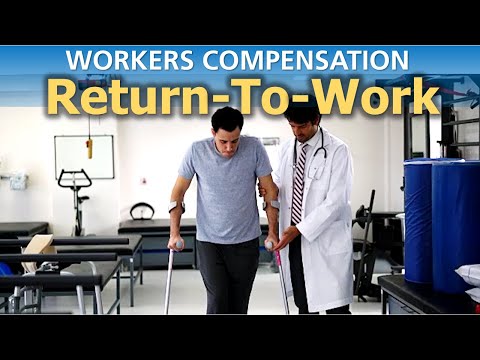
Transitional Return To Work
The program provides a system for returning employees to work quickly and safely after injury or illness by identifying and appropriately managing temporary work restrictions. Studies have shown that the sooner an injured employee can be brought back to work, the faster they will recover and be able to return to their regular work assignments.
The goal of Transitional Return to Work (TRTW) is to assist individuals with work- related illness or injury (and non work-related illness or injury, when possible) resulting in medical restrictions or lost work time. There will be an emphasis on close collaboration between department managers and supervisors to locate appropriate light duty.
This program is designed to transition the employee back to his/her usual and customary position after the illness/injury. Injuries/illnesses resulting in permanent restrictions with a reasonable expectation that the employee will be unable to return to the usual and customary position will be managed under the Vocational Rehabilitation/ ADA guidelines.
Electronic Transitional Return To Work Guide
Video | being updated
Transitional Return to Work Q&A
-
Who is eligible for return to work?
The program covers cases that involve lost time, temporary medical restrictions, and when possible, non-work related cases with temporary medical restrictions if temporary medical restrictions render the employee unable to do some or all of the usual assignment, then some modification of the duties or an alternate assignment may be necessary as a temporary accommodation.
-
What does "light duty" consist of?
The Disability Management Office and supervisor will discuss what, if any, of the regular duties, the employee can perform with the medical restrictions they have been given. If there are several tasks that the employee cannot perform, the supervisor can agree to provide assistance for those types of activities. In some cases where the employee is unable to perform the regular duties, the Disability Management Office and supervisor will explore other assignments that will allow the employee to stay within the limitations set by his/her treating physician. It is important to note that temporary or light duty is normally not considered a permanent or regular position. It is work that has been gathered to give the individual with a disability the opportunity to do meaningful work while they are recovering from his/her illness/injury. The goal is for the employee to return to their usual and customary position when they have recovered from the illness or injury.
-
How long does light duty last?
Temporary work assignments are limited. The number of days of Transitional Return To Work duties is determined by the department. Temporary work normally does not extend beyond 90 days. If the employee has not sufficiently recovered to return to the usual and customary position within the department’s Transitional Return To Work period, then the case will be reviewed by the Disability Management Office and supervisor. Some circumstances, such as an intervening surgery, may result in additional light duty recommended by the physician. Each situation will be evaluated on a case-by-case basis with the physician’s recommendation taken into consideration.
-
What do I get paid?
- You will be paid your regular hourly pay for the time you participate in light duty
- Overtime will not be authorized during light duty
- Every effort will be made to provide you with light duty for the hours that you would normally work
- The home department is responsible for submitting your time card to payroll
-
What happens if I am asked to work outside of the work restrictions set by my physician?
It is your responsibility to work safely. If you are asked to perform a task that is outside of the limitations that were set by your doctor, you must decline. If you feel that you do not need the restrictions, you must obtain a release from your physician. The Transitional Return To Work is designed to provide a safe environment for you to work in. Failure to follow the restrictions set by your physician may result in progressive discipline.
-
What is modified work?
The laws allow for the employer to place the disabled employee into a position for which he/she is fully qualified. This means that the employee must have the education, training and experience required in the job posting. The employee has rights to special selection which is outlined in the Personnel Policy for Staff Members (PPSM) Policy 81: Reasonable Accommodation | PPSM 81 - UCR Local Procedure - Reasonable Accommodation. If a position is located and accepted by the employee, they will be transferred to the new department. The employee will be treated as all transfer employees with regards to employment issues.
-
What happens if I am not able to return to work when my Transitional Return to Work time ends?
If you still have limitations that do not allow you to perform the essential functions of your job, you will be sent home. Employees on Worker’s Compensation will be notified of the change in benefits. They will be paid temporary total disability (TTD) benefits until they are released to work or found to be Permanent and Stationary.
-
What does "Permanent and stationary" mean?
This is often referred to as being "P&S". This means that you have recovered and your condition is “stationary”. Some injuries result in “permanent” work restrictions. The work restrictions are not expected to change in the future.
-
Where do I go after I am "permanent and stationary"?
The Disability Management Office will receive a notice from your adjuster that you have reached a Permanent and Stationary status. The Disability Management Office has 30 days to determine if there is modified or alternative work. If modified or alternative work is not provided, the employee will be referred to a vocational rehabilitation counselor for vocational rehabilitation services.
-
What if my job cannot be modified so that I can continue working?
The laws allow for the employer to place the disabled employee into a position for which he/she is fully qualified. This means that the employee must have the education, training and experience required in the job posting. The employee has rights to special selection which is outlined in the Personnel Policy for Staff Members (PPSM) Policy 81: Reasonable Accommodation | PPSM 81 - UCR Local Procedure - Reasonable Accommodation. If a position is located and accepted by the employee, they will be transferred to the new department. The employee will be treated as all transfer employees with regards to employment issues.
-
What if I am not offered a modified or alternative position?
If a position cannot be located, the employee with industrial injuries will be referred for vocational rehabilitation services.

